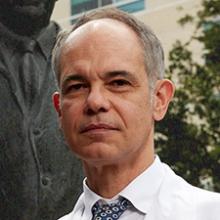As a medical student, do you ever wonder what it's like to specialize in transplant hepatology? Meet Nigel Girgrah, MD (@NGirgrah), a transplant hepatology specialist and a featured physician in the AMA’s “Shadow Me” Specialty Series, which offers advice directly from physicians about life in their specialties. Check out his insights to help determine whether a career in transplant hepatology might be a good fit for you.
The AMA's Specialty Guide simplifies medical students' specialty selection process by highlighting major specialties, detailing training information and providing access to related association information. It is produced by FREIDA™, the AMA Residency & Fellowship Database®.
Learn more with the AMA about the medical specialty of transplant hepatology.
"Shadowing" Dr. Girgrah
Specialty: Transplant hepatology.
Practice setting: Hospital.
Employment type: Multispecialty group practice in New Orleans.
Years in practice: 21.
A typical day and week in my practice: I typically work Monday through Friday, although I'm on call every fourth or fifth weekend. Depending on the day, it might be 7 a.m.–6 p.m. or 7 a.m.–7 p.m, but if I’m light on administration, it's generally 8 a.m.–5 p.m.
The majority of my time is spent on medical administration, but when I'm in the clinical setting, I mainly see patients in ambulatory care. Most of my patients have chronic liver disease, much of which is viral hepatitis, nonalcoholic fatty liver disease and alcoholic liver disease. I also assess pre-liver transplant candidates and manage post-liver transplant patients managing their immunosuppression and any complications they may have after transplant. When I'm on call, however, I'm in the hospital seeing sick patients with advanced chronic liver disease.
The most challenging and rewarding aspects of transplant hepatology: Our patients can be really, really sick, and many don't make it to transplant. Some actually get denied. Plus, there are many patients with advanced chronic liver disease who have extremely challenging socioeconomic situations, which can fragment their care.
Also, there's a lot of emotional labor in this job, and you have to have a lot of difficult, end-of-life discussions with patients and their families. You’ll need people you can confide in—soulmates at work—to get you through those rough patches.
On the other hand, most of the time you’re able to help patients. With liver transplantation, you literally take people who have a few days to live—sometimes maybe only one day—and return them to essentially a normal quality of life, which is extremely gratifying.
Another rewarding feature of liver transplantation is that it’s the definition of a team sport. You’re not a solo guy or a solo gal. You’re working with a multidisciplinary team of social workers, nurses, anesthesia specialists and surgeons. I find that incredibly gratifying. There are frequent Zoom calls with maybe 30 people discussing cases and getting everybody's input. When we make a decision, it's a team decision and no one has veto power.
How life in transplant hepatology has been affected by the global pandemic: There's a lot of loneliness and isolation out there, and unfortunately with that, there has been an uptake in some of the drivers of advanced liver disease. We are seeing increased alcoholism and also weight gain, which drives nonalcoholic fatty liver disease. The demand for transplant services is going up, but the organ supply hasn't increased, and there are some inherent challenges with that. Sometimes by the time a patient gets to see us, they’re almost too sick to be considered for transplant.
The long-term impact the pandemic will have on transplant hepatology: I don't know the answer to that, but I suspect in the next few years we're going to see a lot more advanced liver disease due to the social sequelae of the pandemic. In 2003, I went through the SARS outbreak in Toronto, which was much more limited than this for sure, and there were very well-documented mental health outcomes that went on for years after that. What we’re seeing now as a result of COVID-19 may only be the tip of the iceberg.
Three adjectives to describe the typical transplant hepatology specialist: I’m reminded of a book called The Ideal Team Player, by Patrick Lencioni, which describes the three essential virtues of team players, and I think these apply to teammates in transplant hepatology. Hungry, as in being intrinsically motivated, a self-starter. Humble, meaning being willing to seek help and guidance, not having excessive ego. And smart, as in being emotionally intelligent, having a lot of interpersonal awareness—that’s extremely important when you're working with a larger team.
How my lifestyle matches, or differs from, what I had envisioned: I struggled in medical school and residency to settle on a specialty because I loved general aspects of medicine, and I could never understand how somebody knew from the get-go that they wanted to be, say, an eye specialist. One really rewarding thing about hepatology is that the liver is like a master organ that can control the way we think, the way the heart functions, the way the kidney functions. It really resonated with me because it allowed me to focus on something, but it also allowed me to think more broadly.
But it’s important to realize that most transplant centers are in urban environments. If you have a desire to settle in the country, that's going to be pretty tough. Plus, the hours can be long. You ask a lot of your family, and sometimes you miss baseball games. I can't tell you how many times I thought I was going to a six o'clock baseball game and then had to call my wife at the last minute to say I couldn’t make it.
Also, most people go to medical school thinking they’re going to be just a clinician and a healer, but there is a duality to the profession. There’s also an economic and regulatory side to medicine that creates some inner conflict and stress.
Skills every physician in training should have for transplant hepatology but won’t be tested for on the board exam: For starters, compassion is needed to deal with the emotional labor associated with being a physician. I think this is true of many specialties but especially liver transplant. Also, resilience. You’ll often have to work late nights because very sick patients don't just appear during normal business hours. Plus, if you're working at a transplant center, you’re a referral hub, so people will need to be able to reach you. I don't know how many physicians across the country have my cell phone number.
One question physicians in training should ask themselves before pursuing transplant hepatology: How soon do you need to complete your training? I did four years of general medicine and then three years of gastroenterology and hepatology. If you can’t withstand that many years of training, this may not be the specialty to choose.
Books every medical student interested in transplant hepatology should be reading:
- Exhale: Hope, Healing and a Life in Transplant, by David Weill, MD. David is a lung transplant doctor and a friend and colleague of mine. The great thing about this book is it talks about the trials and tribulations of being a transplant doctor, including burnout.
- Zakim and Boyer's Hepatology, by Thomas Boyer, MD, and Keith Lindor, MD.
- Schiff’s Diseases of Liver, edited by Eugene R. Schiff, MD, Willis C. Maddrey, MD, and K. Rajender Reddy, MD.
The online resource students interested in transplant hepatology should follow: The one that's most useful to me is the American Association for the Study of Liver Disease’s website, aasld.org. It has a wealth of information—best practices, reviews of diseases and treatment guidelines.
Quick insights I would give students who are considering transplant hepatology: Two things. First, get a mentor, a staff physician who has the time and interest to help you succeed. Second, to do hepatology you have to go through a fellowship in gastroenterology, and those fellowships are very difficult to get into. So you've got to do well in your rotations, get great reference letters and maybe engage in research.
Mantra or song to describe life in transplant hepatology: “The Waiting," by Tom Petty and the Heartbreakers. When you think about patients on the transplant list, there is a lot of anxiety about waiting because transplants don't get scheduled at, say, noon on a Tuesday. Patients wonder, “Am I going to get transplanted in a couple of months? A couple years? Am I going to get called in in the middle of the night?”




